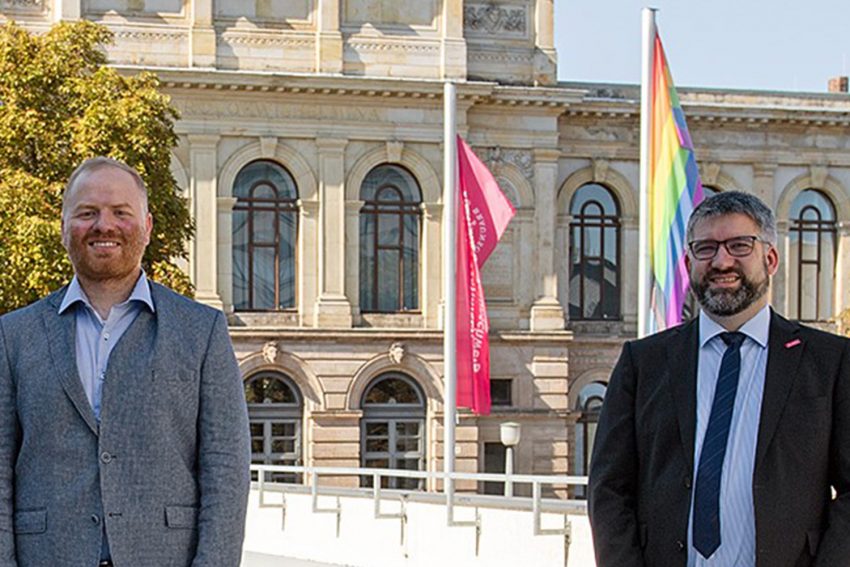Next Generation Theoretical Chemistry A conversation with Professor Christoph Jacob and Professor Jonny Proppe about the Theoretical Chemistry Symposium 2024
This year’s Symposium on Theoretical Chemistry (STC), which is being organised for the sixtieth time this year, begins on Monday. Technische Universität Braunschweig is hosting the conference with almost 400 participants under the motto ‘Next Generation Theoretical Chemistry’. An interview with Jonny Proppe and Christoph Jacob about current topics in theoretical chemistry and challenges in organising the event.
Next week, the Department of Theoretical Chemistry at Technische Universität Braunschweig is organising this year’s Symposium for Theoretical Chemistry. What is so special about this event?
Proppe: The STC is the largest conference for theoretical chemists in the German-speaking world. It is held annually in Germany, Austria or Switzerland – this year for the sixtieth time. The conference language is English, of course, and we expect a large international audience.
Jacob: This year we have chosen the theme “Next Generation Theoretical Chemistry”. We want to focus on the many new developments that have taken place in recent years and also provide a platform for young colleagues.
First of all, what distinguishes theoretical chemistry from other branches of chemistry? And what are the latest developments in this field?
Jacob: Theoretical chemists work on simulating reactions and properties of molecules and materials on the computer, i.e. we are not in the lab, but we try to predict what happens in the lab.
Proppe: Thanks to increasingly powerful computers, it is now possible to perform calculations for ever larger systems, such as biomolecules or new materials. Such complex chemical systems lead to completely new challenges, which have become increasingly important in recent years. A recent development is the use of machine learning and artificial intelligence in chemistry. This is also reflected in our programme, which offers a number of exciting contributions from these areas. The TU Braunschweig is not only very active in research in this field, we are also launching an international Master’s programme in Artificial Intelligence in Molecular Sciences in the winter semester: “Artificial Intelligence for Molecular Science (AIMS)“.
The theme “Next Generation Theoretical Chemistry” refers not only to new developments in research, but also to the next generation of researchers. The conference is explicitly designed to give them a platform. How does this work?
Proppe: We made sure that we invited young scientists in particular to give a talk or a workshop. We actively approached people in our network who may not have given many talks at such large conferences, but who are working on exciting topics.
Jacob: And I think we also managed to attract a diverse group of speakers. We have achieved a good gender balance among the invited speakers, and we also have a high proportion of women in the contributed talks. I am delighted that we have been able to offer a really exciting programme with many young and international speakers.
What were the biggest challenges in organising a conference of this size here in Braunschweig?
Jacob: I think it’s always a big challenge to organise a conference of this size. However, I think the TU Braunschweig is very well placed to organise it. We have a very nice, large lecture hall in the Audimax. It also provides a good space for dialogue during the breaks before and after the talks and during the poster sessions.
Proppe: A big advantage of Braunschweig is the relatively short distances, which means that most places are within easy walking distance. I think we’ve also managed to put together a great social programme in the city – with rafting on the Oker, bouldering and city tours. There’s something for everyone.
In closing: What do you wish for the event and the participants?
Proppe: For the participants, that they take away many new ideas and make a lot of nice new contacts.
Jacob: For the event, that the weather is good and that all participants enjoy Braunschweig and have good memories of it.

